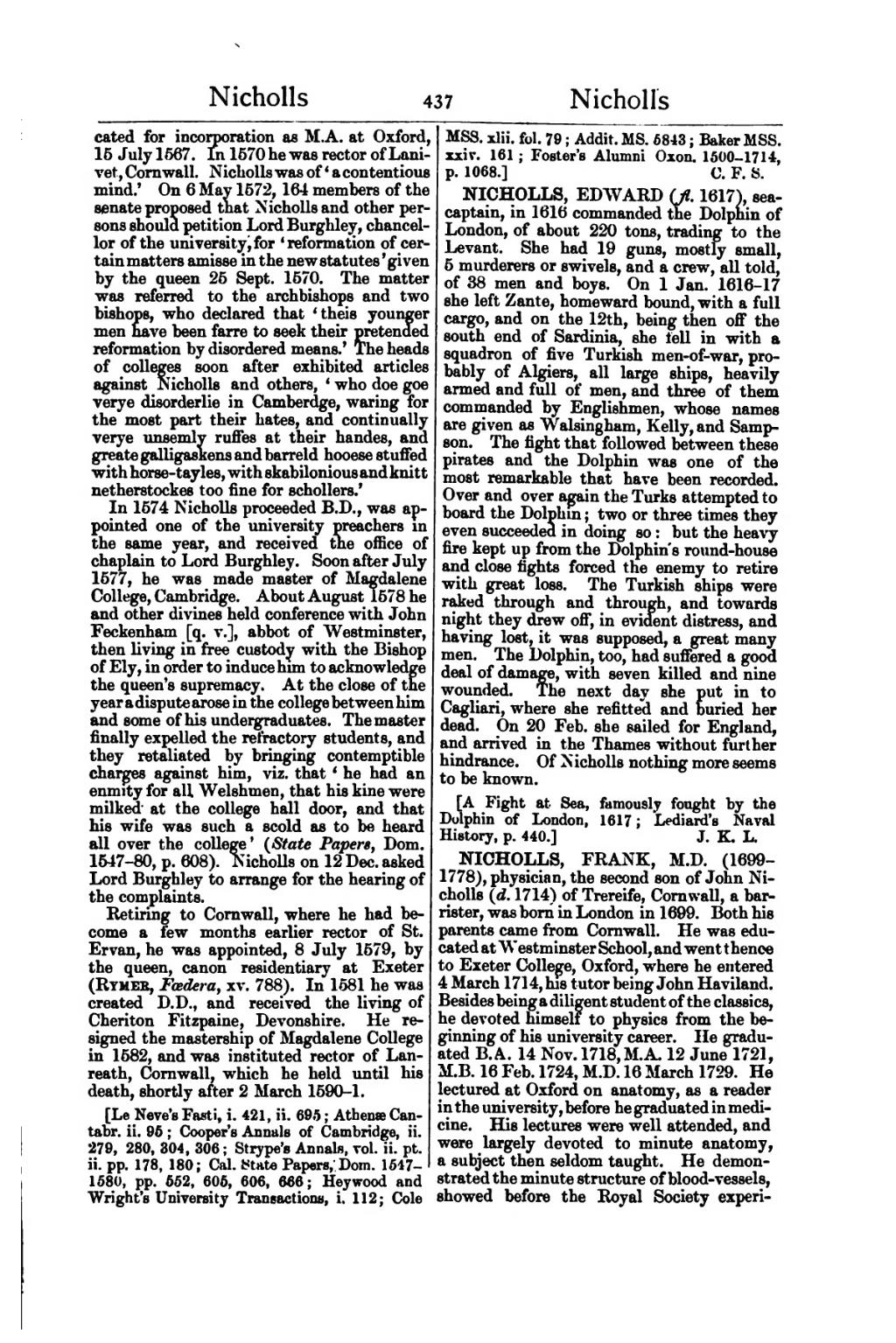cated for incorporation as M.A. at Oxford, 15 July 1567. In 1570 he was rector of Lanivet, Cornwall. Nicholls was of ‘a contentious mind.’ On 6 May 1572, 164 members of the senate proposed that Nicholls and other persons should petition Lord Burghley, chancellor of the university, for ‘reformation of certain matters amisse in the new statutes’ given by the queen 25 Sept. 1570. The matter was referred to the archbishops and two bishops, who declared that ‘theis younger men have been farre to seek their pretended reformation by disordered means.’ The heads of colleges soon after exhibited articles against Nicholls and others, ‘who doe goe verye disorderlie in Camberdge, waring for the most part their hates, and continually verye unsemly ruffes at their handes, and greate galligaskens and barreld hooese stuffed with horse-tayles, with skabilonious and knitt netherstockes too fine for schollers.’
In 1574 Nicholls proceeded B.D., was appointed one of the university preachers in the same year, and received the office of chaplain to Lord Burghley. Soon after July 1577, he was made master of Magdalene College, Cambridge. About August 1578 he and other divines held conference with John Feckenham [q. v.], abbot of Westminster, then living in free custody with the Bishop of Ely, in order to induce him to acknowledge the queen's supremacy. At the close of the year a dispute arose in the college between him and some of his undergraduates. The master finally expelled the refractory students, and they retaliated by bringing contemptible charges against him, viz. that ‘he had an enmity for all Welshmen, that his kine were milked at the college hall door, and that his wife was such a scold as to be heard all over the college’ (State Papers, Dom. 1547–80, p. 608). Nicholls on 12 Dec. asked Lord Burghley to arrange for the hearing of the complaints.
Retiring to Cornwall, where he had become a few months earlier rector of St. Ervan, he was appointed, 8 July 1579, by the queen, canon residentiary at Exeter (Rymer, Fœdera, xv. 788). In 1581 he was created D.D., and received the living of Cheriton Fitzpaine, Devonshire. He resigned the mastership of Magdalene College in 1582, and was instituted rector of Lanreath, Cornwall, which he held until his death, shortly after 2 March 1590–1.
[Le Neve's Fasti, i. 421, ii. 695; Athenæ Cantabr. ii. 95; Cooper's Annals of Cambridge, ii. 279, 280, 304, 306; Strype's Annals, vol. ii. pt. ii. pp. 178, 180; Cal. State Papers, Dom. 1547–1580, pp. 552, 605, 606, 666; Heywood and Wright's University Transactions, i. 112; Cole MSS. xlii. fol. 79; Addit. MS. 5843; Baker MSS. xxiv. 161; Foster's Alumni Oxon. 1500–1714, p. 1068.]
NICHOLLS, EDWARD (fl. 1617), sea-captain, in 1616 commanded the Dolphin of London, of about 220 tons, trading to the Levant. She had 19 guns, mostly small, 5 murderers or swivels, and a crew, all told, of 38 men and boys. On 1 Jan. 1616–17 she left Zante, homeward bound, with a full cargo, and on the 12th, being then off the south end of Sardinia, she fell in with a squadron of five Turkish men-of-war, probably of Algiers, all large ships, heavily armed and full of men, and three of them commanded by Englishmen, whose names are given as Walsingham, Kelly, and Sampson. The fight that followed between these pirates and the Dolphin was one of the most remarkable that have been recorded. Over and over again the Turks attempted to board the Dolphin; two or three times they even succeeded in doing so: but the heavy fire kept up from the Dolphin's round-house and close fights forced the enemy to retire with great loss. The Turkish ships were raked through and through, and towards night they drew off, in evident distress, and having lost, it was supposed, a great many men. The Dolphin, too, had suffered a good deal of damage, with seven killed and nine wounded. The next day she put in to Cagliari, where she refitted and buried her dead. On 20 Feb. she sailed for England, and arrived in the Thames without further hindrance. Of Nicholls nothing more seems to be known.
[A Fight at Sea, famously fought by the Dolphin of London, 1617; Lediard's Naval History, p. 440.]
NICHOLLS, FRANK, M.D. (1699–1778), physician, the second son of John Nicholls (d. 1714) of Trereife, Cornwall, a barrister, was born in London in 1699. Both his parents came from Cornwall. He was educated at Westminster School, and went thence to Exeter College, Oxford, where he entered 4 March 1714, his tutor being John Haviland. Besides being a diligent student of the classics, he devoted himself to physics from the beginning of his university career. He graduated B.A. 14 Nov. 1718, M.A. 12 June 1721, M.B. 16 Feb. 1724, M.D. 16 March 1729. He lectured at Oxford on anatomy, as a reader in the university, before he graduated in medicine. His lectures were well attended, and were largely devoted to minute anatomy, a subject then seldom taught. He demonstrated the minute structure of blood-vessels, showed before the Royal Society experi-
